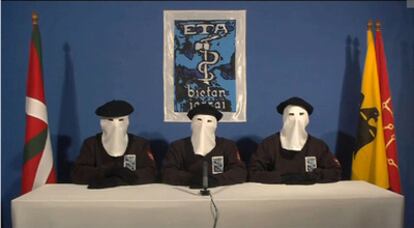Doubts over ETA ceasefire after group says "military action is irrefutable"
Terrorist organization approved a resolution in November backing use of violence
ETA leaders have pledged to continue using violence in the fight for independence for the Basque region, in a recent resolution that undermines the attempted peace process put in motion by the group's political wing.
The phrase "Our starting point is that a joint political military strategy is irrefutable" headed up one of the paragraphs in the document, which has just come to light.
The text was approved in November, in response to mounting pressure to give up the armed struggle from ETA's political wing, the radical Basque left izquierda abertzale.
The terrorist group does not believe in submitting to the abertzale's line and has no intention of giving up violence, according to sources who have seen the documents. They show ETA's core leadership resisting pressure from the abertzale and, at least for now, without any intention of making any major concessions that would clear the path to legalization for political party Batasuna, which hopes to stand in local Basque elections in May.
The abertzale formally called on ETA to call a "permanent, unilateral and internationally verifiable ceasefire" in the Gernika Declaration of September 2010.
In response, ETA leaders consulted with a small circle of militants - excluding imprisoned members to avoid infiltration and interference - before drawing up a communiqué released last Monday, which announced a permanent truce.
The Spanish government reacted coolly to the statement, which was heavily criticized as "insufficient." This view is strengthened by the latest revelations, which suggest unless there is shift in power relations or outside pressure increases, ETA will hold out for a political prize after a half-century of bloody conflict.
The likelihood of ETA's surrender is complicated by a constantly changing high command. Despite rumors to the contrary, there is no evidence that the old guard have any influence over new leaders who, freshly installed in positions of power, are unlikely to agree to dismantle the organization.
But pressure on ETA is building. The abertzale paid a high political prize after ETA broke its last "permanent ceasefire" in 2006 with a deadly attack on Madrid's Barajas airport that killed two people. They insist that their commitment to peace is irreversible.
Meanwhile the Spanish government has pressed on with police action against ETA. They arrested two suspects just hours after last week's communiqué. Prime Minister José Luis Rodríguez Zapatero has repeated that "the end of ETA will be hard, costly and difficult."

Tu suscripción se está usando en otro dispositivo
¿Quieres añadir otro usuario a tu suscripción?
Si continúas leyendo en este dispositivo, no se podrá leer en el otro.
FlechaTu suscripción se está usando en otro dispositivo y solo puedes acceder a EL PAÍS desde un dispositivo a la vez.
Si quieres compartir tu cuenta, cambia tu suscripción a la modalidad Premium, así podrás añadir otro usuario. Cada uno accederá con su propia cuenta de email, lo que os permitirá personalizar vuestra experiencia en EL PAÍS.
¿Tienes una suscripción de empresa? Accede aquí para contratar más cuentas.
En el caso de no saber quién está usando tu cuenta, te recomendamos cambiar tu contraseña aquí.
Si decides continuar compartiendo tu cuenta, este mensaje se mostrará en tu dispositivo y en el de la otra persona que está usando tu cuenta de forma indefinida, afectando a tu experiencia de lectura. Puedes consultar aquí los términos y condiciones de la suscripción digital.








































